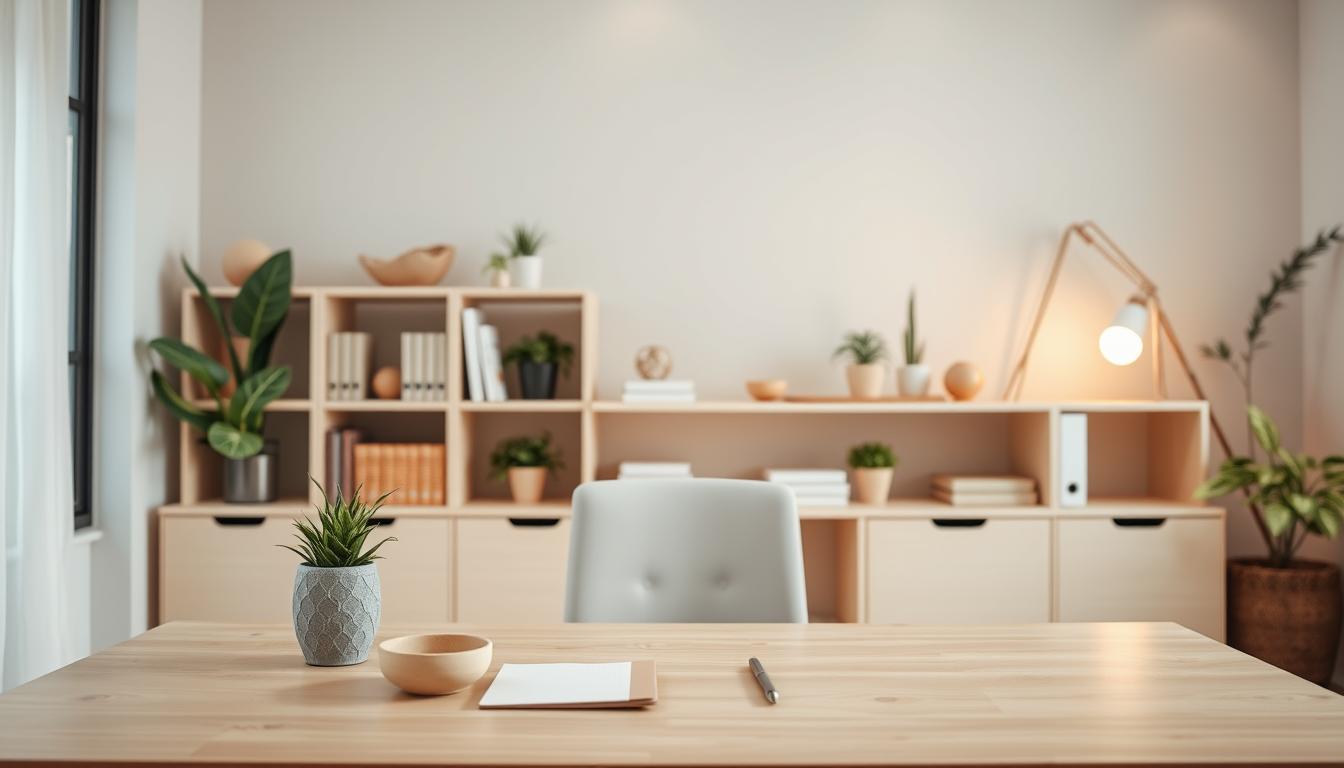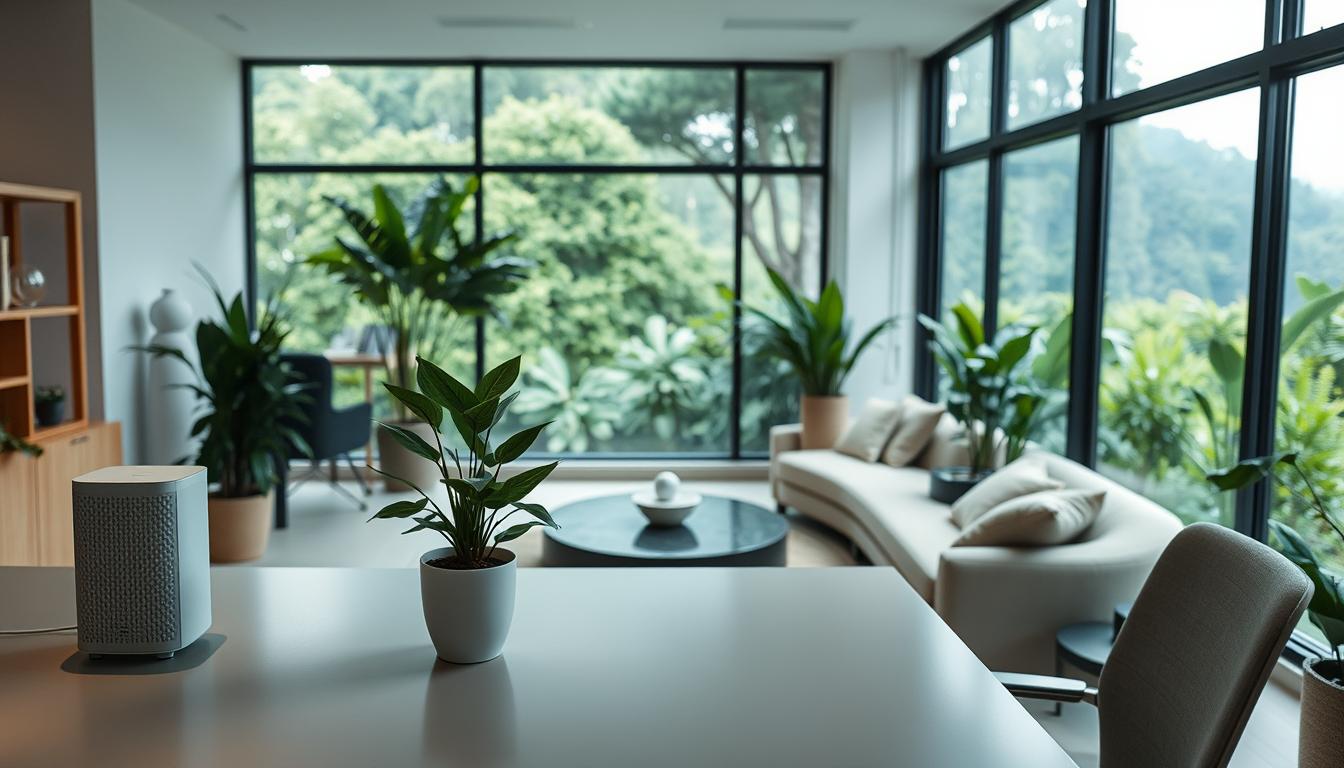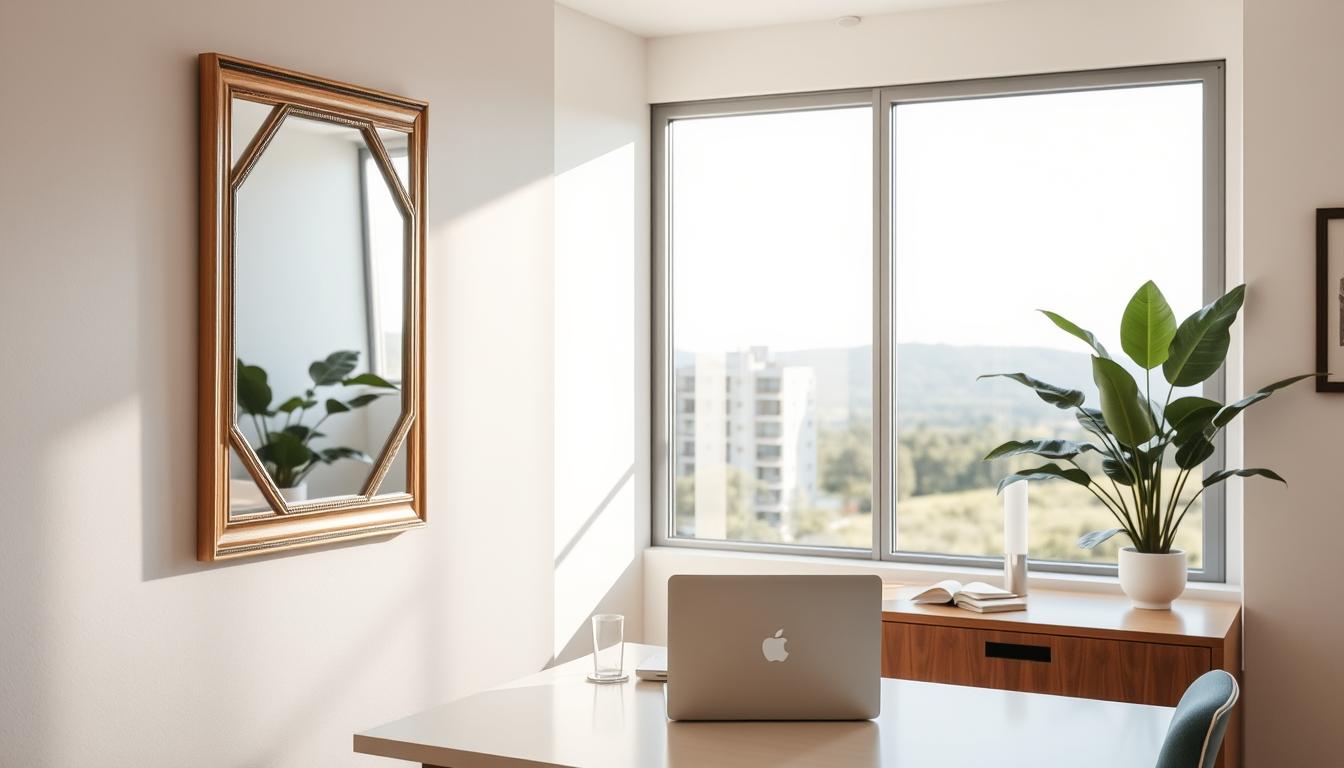In today’s fast-paced work environment, enhancing office productivity is key. One effective way is by using Feng Shui principles for a harmonious workplace. This practice focuses on balance and energy flow, improving the space where we work.
Studies have found that happy workers are up to 16% more productive. They also prefer having their own workspace over unlimited vacation, 42% to 28%. By adding Feng Shui to offices, companies can boost employee happiness and productivity. We will explore Feng Shui’s key ideas, its history, and tips for a better workspace.
Understanding the Basics of Feng Shui
Feng Shui is a way to make spaces better, especially at work. It uses key principles of balance and energy flow. At its heart is the concept of chi, or life force, that moves through all things. Understanding chi can help you make a more organized and peaceful work area. This leads to improved focus and creativity.
The Concept of Chi
Chi affects how we interact and how productive we are. By grasping chi, you can direct energy with the right furniture, colors, and nature. For example, placing desks so you can see the door, but not in line with it, boosts control and safety. Using the Bagua, a vital Feng Shui tool, breaks spaces into nine parts. These parts link to life’s different aspects. It helps in making spaces that reflect your goals at work and in life.
Historical Significance and Evolution
Feng Shui’s history goes back more than 4,000 years, starting with ancient Chinese geomancy. It’s changed a lot, shaping today’s building designs and decoration ideas. Despite changes, it sticks to crucial ideas like balancing Yin and Yang and using the Five Elements—Wood, Fire, Earth, Metal, and Water. These elements interact in ways that can either boost or block good energy. Many historical figures and cultures have used Feng Shui, showing its lasting importance in making better living and working spaces.
How Feng Shui Influences Workplace Productivity
Feng Shui improves workplace productivity by enhancing energy flow and creating a positive environment. A well-planned office boosts focus and makes employees feel connected to their workspace. Making simple changes can greatly increase productivity and job satisfaction.
Enhancing Focus Through Energy Flow
Positioning desks to face the door helps boost productivity through Feng Shui. This setup makes people feel secure, which is essential for focus. Being exposed to natural light can make workers up to 15% more productive.
Using warm colors like red and orange can raise enthusiasm. On the other hand, blues and greens help calmness. This balance aids in maintaining a focused and productive mindset.
Creating a Positive Work Atmosphere
Keeping a workspace clear of clutter is key to a positive atmosphere. Cleaning up regularly can boost productivity by up to 25%. It reduces distractions and stress.
Adding natural elements like plants helps create a calm setting, improving focus. Organized storage solutions keep essential items within reach, streamlining work processes. This also keeps the office looking professional.
The Importance of Feng Shui in Office Environment
Using Feng Shui in offices is key to creating a great work space. It’s all about making Yin and Yang energies balance. This makes a place that boosts creativity and calmness. When these forces align, everyone can do their best in a supportive space. A thoughtfully designed office boosts happiness, drive, and work output.
Balancing Yin and Yang
Yin and Yang are about balance. They are opposite, but they complement each other. Yin is quiet and reflective. Yang is active and energetic. Combining them right makes an office feel both peaceful and vibrant. Adding natural light and plants helps achieve this balance. It makes the space feel alive but also soothing because of the greenery.
Supporting Employee Well-being
A workspace in harmony is great for well-being. A clean and organized place helps focus and clears the mind. Using comfortable furniture lessens body pain. Also, calming colors and nice smells boost mood and work output. Happy workers are shown to be up to 13% more productive. This shows how important a well-thought office design is.
Designing Your Feng Shui Office
Creating a Feng Shui office means careful planning. A good office setup supports positive energy and increases productivity. Choose a spot with plenty of natural light and a nice view. Such an environment improves mood and helps focus.
Selecting the Right Location
Finding the right spot is key for a productive office. Look for places that are bright and not too stuffy. When placing desks, make sure employees can see the door without being directly in front of it. This position gives them a sense of control and lowers stress.
Positioning Key Elements for Flow
Placing key elements wisely can boost office energy. Use ergonomic furniture for comfort and to lessen body pain, as comfy seating boosts work output. Add natural elements, like peace lilies, for better air and mood. Brighten up the place with reflective materials to add light and balance.
Think about using colors that match Feng Shui elements. Each color helps with mental focus and emotional calmness. Picking the right furniture and colors adds meaning to the office, helping everyone work better.
Utilizing Natural Light and Colors
Natural light and the choice of colors are key to an ideal workspace. The right amount of sunlight adds positive vibes, thanks to Feng Shui. It makes us feel better and brings harmony. A bright room is full of Yang energy, making things lively and fun. But, a room with little light has Yin energy, which is calm and thoughtful.
The Benefits of Natural Light
Bringing in more natural light can make the office feel alive. It lets the Qi, or energy, flow well. Having windows in the right spots brings in plenty of sunlight, lifting spirits and making us work better. If you add adjustable curtains or blinds, you can manage the light perfectly. This keeps the office comfy. For less sunny areas, warm lights or full-spectrum bulbs can recreate that natural feel, especially in spots meant for rest.
Selecting Harmonious Color Palettes
The colors around us impact how we feel at work. Light yellow, green, and blue can create a good Feng Shui vibe. They help us think clearly and concentrate. Green or brown tones are calming, and blue adds a peaceful touch, like water. A splash of red can bring joy and wealth without being too much. The right mix of colors keeps everyone feeling positive, making for a more effective work area.
Incorporating the Five Elements of Feng Shui
Understanding Feng Shui’s Five Elements is key for a well-balanced office. Wood, Fire, Earth, Metal, and Water each affect the energy in a workspace. Smartly using these elements can boost both happiness and work efficiency.
Wood, Fire, Earth, Metal, and Water
Wood brings growth and life, often through plants or wood furniture. Greenery helps keep the peace and sparks creativity in workers. Fire, shown in warm lights or red colors, drives motivation and breathes life into the office.
Earth adds stability with ceramics, stones, or neutral colors. It creates a dependable space for staff. Metal, seen in desk items and other fixtures, helps with organization. Water, with fountains and mirrors, adds peace and flexibility.
Why Each Element Matters in Designs
Placing these elements wisely boosts their positives. Water features should face north or be near the entrance for more success and good vibes. Wood, like with plants, brings calmness and balance to a place.
It’s also smart to focus on entrances. Keeping them clean and inviting, with art or plants, makes a good first impression. Using natural elements and colors from Feng Shui in the office helps achieve harmony. Having desks face the entrance makes people feel secure and trusted at work.
Maintaining a Clutter-Free Workspace
A clutter-free workspace is key to clear thinking and working efficiently. Clutter can make it hard to focus and lower how much you get done. When things are messy, it can cause stress, making it tough to think straight and work well. Making your workspace organized can turn it into a productive place.
The Psychology of Clutter
To work better, keeping your space tidy is important. Here’s how to keep your workspace clear:
- Use shelves and desk organizers to keep important things.
- Turn paper files into digital ones to reduce clutter and save space.
- Get rid of things you don’t need regularly.
- Keep things you use a lot within easy reach.
- Add plants and natural light to make the space nicer and lift your spirits.
- Use colors in your space to help make you feel better and work more effectively.
- Have a good filing system with labels for quick finding.
- Keep your desk area spacious with only a few items in sight for better concentration.
- Put something on your desk that makes you happy, like artwork or a personal item.
- Place your desk so you can see the door. It helps you feel in control.
Having a clear workspace boosts how much you can do and shows you’re professional. This can improve how you get along with others at work. By applying these tips and keeping your area neat, you can reach your top potential and grab new chances.
Ergonomics and Feng Shui Synergy
Mixing ergonomic furniture with Feng Shui can make office spaces way more comfortable. This blend focuses on both how comfortable furniture is and how energy moves around. It helps companies make offices that boost work and health.
Importance of Ergonomic Furniture
Choosing chairs with high backs and desks that are L-shaped shows we value support and openness. High-backed chairs give important support and mean safety, making offices comfy. An adjustable desk lets people sit or stand, which is good for health and matches Chi’s flow.
Creating Comfort and Flow
To do Feng Shui right, think about colors, nature, and where things go. Peaceful colors like blue and green make places calm, while yellow brings out creativity for balance. Adding plants like bamboo cleans the air and brings in life, linking Feng Shui with staying healthy.
Put your desk where it’s in charge to control your space and do better work. Clean out your desk often to keep energy moving well. It makes your space welcoming and neat.
The Role of Personalization in Office Feng Shui
Personalization is key in making office Feng Shui work. It transforms work areas into places that boost productivity and happiness. When employees can make their space their own, they feel more connected to it. This leads to feeling more comfortable and happy at work. A well-customized office also looks welcoming, showing off each person’s style while improving the office vibe.
Allowing Employees to Customize Their Spaces
When employees can tailor their workspace, it meets their needs better. This change doesn’t just make them work better; it also creates a more balanced office feel. By having things like colorful mugs, comfy wrist rests, and neat wall organizers, personal style shines through without losing function. Adding plants brings a piece of nature inside, which is good for the mood.
Putting up pictures of family or friends adds a personal touch. It helps maintain emotional ties without taking up desk space. Starting with small, useful items helps slowly add unique touches while keeping the office looking professional. Using Feng Shui to arrange desks can enhance both productivity and wellbeing. Companies like Moon FengShui provide personalized Feng Shui advice. They help blend different methods to get the best results.

Regular Maintenance for Sustained Productivity
Keeping a lively workspace means paying attention to cleaning and sorting things out. A well-maintained workspace boosts productivity by keeping the energy up and cutting down distractions. Regularly tidying up not just betters the space but also fosters an area where ideas and work flow smoothly.
Cleaning and Decluttering Practices
For a workspace that lifts spirits, think about these tips:
- Make it a habit to clean and declutter regularly to remove old energy, making the workspace feel new. Try to tidy up weekly.
- Changing your office layout now and then meets your evolving needs. Trying out new setups can make the energy in your space better.
- Set up special spots for breaks to keep work and relaxation balanced. A cozy corner for chilling out can really boost work efficiency.
- Use smart storage options to keep your area tidy and stop clutter from piling up.
- Beginning and ending your day by organizing your desk helps maintain a positive work atmosphere and keeps you motivated.
- Add air purifiers or plants to improve air quality, helping you concentrate more and do better at your job.
- Including Feng Shui methods in your upkeep routines can also make your workspace work better for you.
Conclusion
Using Feng Shui in offices leads to many benefits that boost how much work gets done. Thoughtful design lets businesses make places where people work well together. In these spaces, employees feel strong and ready to come up with new ideas and work as a team.
Putting desks in a key spot helps with focus and making choices. Having natural light and fresh air improves how clear people think and their overall health. Also, using peaceful colors like blue and green sparks creativity and stability, key for a good work place.
Keeping spaces clear of clutter lets energy move freely and lowers stress, important for more work output. As offices change, blending new tech with Feng Shui opens up great chances. It creates balanced, effective areas that make employees happy and healthy. Following these ideas means building a place where employees are driven and inspired to do their best work.
FAQ
What is Feng Shui and how does it impact the workplace?
How does the concept of chi influence my office design?
What historical significance does Feng Shui have?
What are the practical benefits of a Feng Shui workspace?
How can I balance yin and yang energies in my office?
What are effective ways to design a Feng Shui office?
Why is natural light essential in the workplace?
What are the five elements of Feng Shui, and how can they be incorporated?
How do I maintain a clutter-free workspace?
How do ergonomics play a role in Feng Shui?
Why should personalization be encouraged in Feng Shui office design?
What regular maintenance practices should be implemented for a Feng Shui workspace?
Content created with the help of Artificial Intelligence.



